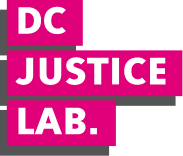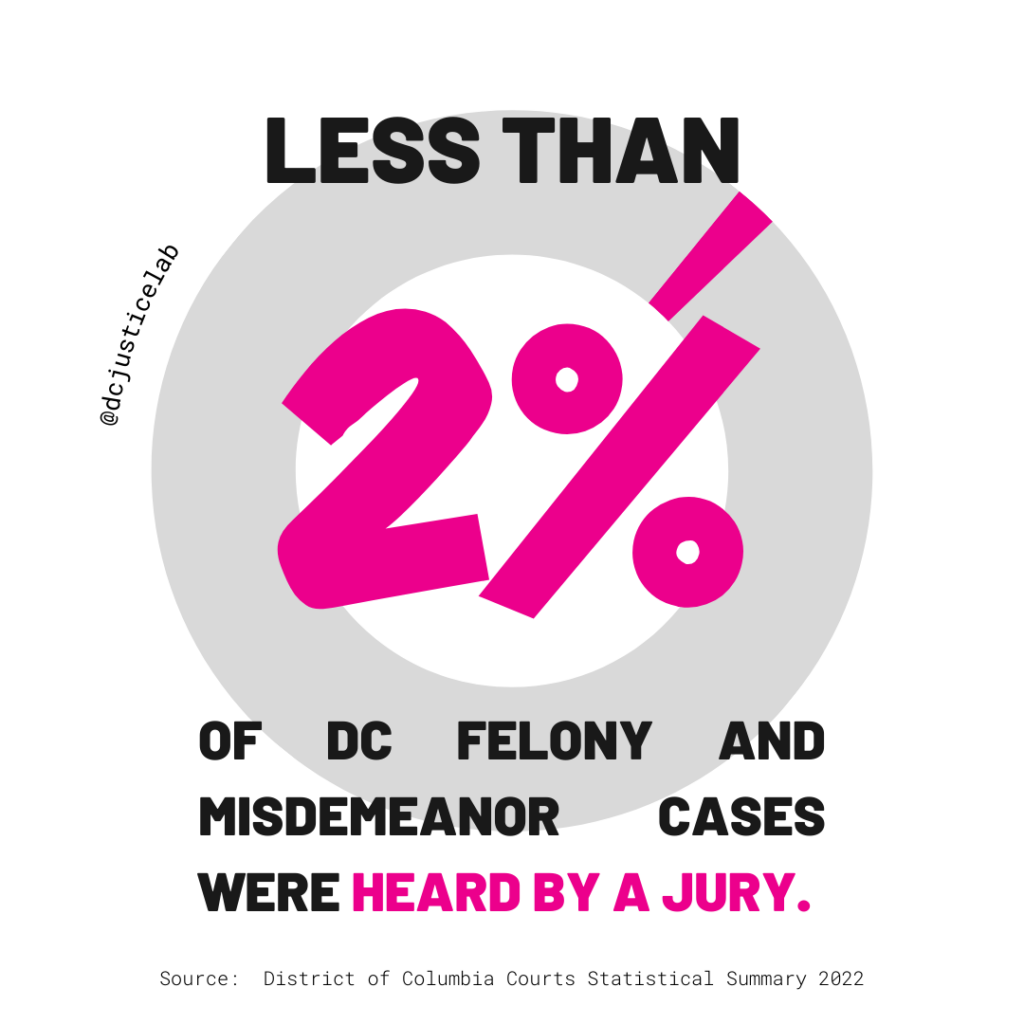
Jury demandability
In DC, you can demand a jury trial of your peers if you face a lawsuit for $20 or more, but not if you face 180 days in jail.
- 5 Minute Read
The right to demand a jury trial is fundamental to U.S. democracy. It provides citizens a voice in the judiciary, educates jurors on the justice system, and provides defendants with access to due process, and produces fairer case outcomes. Restricting a right to demand a jury trial shifts power to prosecutors to force defendants to take plea deals and exposes individuals to lifetime collateral consequences they might have avoided. DC is one of only 10 jurisdictions that has decreased the number of jury-demandable criminal offenses to the constitutional minimum – 35 states provide a right to a jury trial in all criminal prosecutions in the first instance. A piecemeal approach where restoring jury demandability for one offense may lead to prosecutors charging another crime where a defendant can’t request a jury of their peers. DC should pass a law to allow someone to demand a trial by jury in all cases carrying jail time, reduce prosecutions of non-violent misdemeanor offenses to free up court resources for trials, and provide more oversight over plea deals.

What you need to know
Jury trials are a check on the judiciary, protect defendants' rights, and increase transparency.
The Supreme Court has repeatedly ruled that the right to a criminal jury trial is paramount to preventing government oppression and checking the powers given to judges, prosecutors, and police. The right to a jury trial is one of a few enumerated rights within the unamended Constitution that is affirmed twice through the Sixth Amendment and Seventh Amendment, highlighting these rights’ critical role in the U.S. legal system. A jury of one’s peers protects citizens from arbitrary actions by prosecutors and judges with alternative agendas, and many judges and attorneys agree that jury trials are more fair than other disposition methods. Jury trials further provide “checks and balances” on the judiciary in which citizens can actively participate in the legal system and provide feedback and guidance to judges and attorneys alike. Jury trials encourage deliberative democracy, educate voters, and provide citizens a voice in the justice system. Without the right to demand a jury trial, a defendant is more likely to enter processes whether they are forced to accept guilty pleas or a bench trial in front of a judge.
Through legislation, DC narrowed access to demand a jury trial.
In response to a time when homicides and crime reached new highs in the early 1990s and concerns that the judicial process had moved more expeditiously, the Council of the District of Columbia enacted legislation that limited the right to demand a jury trial. The 1992 Criminal and Juvenile Justice Reform Amendment Act increased the threshold for someone to demand a jury trial to only crimes punishable by imprisonment for more than 180 days (up from 90 days). The 1994 Omnibus Criminal Justice Reform Amendment Act reduced penalties for over forty misdemeanor offenses to exactly 180 days. While at the time, the justification for these changes was that misdemeanor trials were inefficient, one former federal prosecutor said, “The US Attorney’s Office didn’t like how Black jurors were responding to some of its criminal cases. That’s the reality….it is no coincidence that in the jurisdiction that has the highest proportion of African American jurors, those jurors have the fewest rights to access jury trials.” The narrowing of the right to demand a jury trial remained in place during the following decades when crime declined.
Restricting a right to a jury trial means more trials without a judge or no trials at all.
While most states provide a right to a jury trial in most criminal prosecutions, DC and nine other jurisdictions have set the standard for jury demandability at the constitutional minimum. As of 2022, there were 4,951 felony cases and 7,961 misdemeanor cases processed by the courts. Half of both felonies and misdemeanors were disposed of via non-trial methods. Only 1 percent of felonies and 1.6 percent of misdemeanors were dismissed for want of prosecution—meaning the prosecution declined to pursue the case. Most often, felonies and misdemeanor cases ended with a plea deal: 41 percent of felonies ended in a guilty plea or were dismissed for a plea agreement, and 25 percent of misdemeanor cases ended the same way. Of the cases that ended in trial, 1.7 percent of felonies went before a jury, and only 0.2 percent were resolved in a bench trial. In comparison, only 0.1 percent of misdemeanors went to a jury trial, and 2 percent of misdemeanors went to a bench trial.
Restricting a right to a jury trial can lead to severe lifelong consequences for a defendant.
One of the theories behind the changes that restricted the right to demand a jury trial was the amount of time someone could be sentenced, which was an indicator of whether the consequences of the case were serious enough to warrant the resources of a jury trial. Several non-jury demandable “minor misdemeanors” may not call for imprisonment but do require defendants who plead or are found guilty to register in national registries, such as those for sex offenses. These registries limit someone’s rights and access to jobs, and lifelong instability and failure to register are crimes that carry harsher sentencing. In these cases, the accused cannot bring their case before a jury until they have committed a registration offense that carries harsher punishment and does not allow them to address whether they should have had to register in the first place.
Piecemeal changes will not prevent prosecutors from charging crimes to avoid a jury trial.
Prosecutors can charge defendants with non-jury demandable offenses to avoid jury trials and increase the likelihood that the defendant will plead out or seek an alternate means of resolution. One example of this is the 1990s law changes that left open the right for jury trial in certain cases involving the exercise of constitutional rights, for example, threats or unlawful entry. The United States Attorney’s Office of the District of Columbia started charging “attempted” unlawful entry or “attempted” threats to get around the 180-day threshold for jury trials. DC changed the law around assault on a police offense (APO) so that the APO and resisting arrest offenses became crimes where the defendant could demand a jury. In 2017 and 2018, charges for these offenses fell by nearly 66 percent, whereas charges of simple assault–a charge where you cannot demand a jury – rose at nearly the same rate. Against the intention of the NEAR Act, the Council of the District of Columbia has voted over the years to create loopholes where someone facing an assault on a Police Officer charge could, instead, be charged with something similar where they cannot demand a jury trial.
WHERE TO LEARN MORE
DC Criminal Code Reform Commission February 2020
National Association of Criminal Defense Lawyers 2018
Louisiana Law Review, Volume 81, Number 1 (Fall 2020) December 2020
American Bar Association: Criminal Justice Section April 2024
Testimony, The Revised Criminal Code Act of 2021 December 2021
Our Solutions
DC Should:
- DC should legislate to allow someone to demand a trial by jury in all cases carrying jail time
- Provide more court or third-party oversight of plea bargains
- Reduce prosecutions of nonviolent misdemeanors and reallocate court resources to jury trials
special thanks
Alexis Berg ★ Theodore Howard



